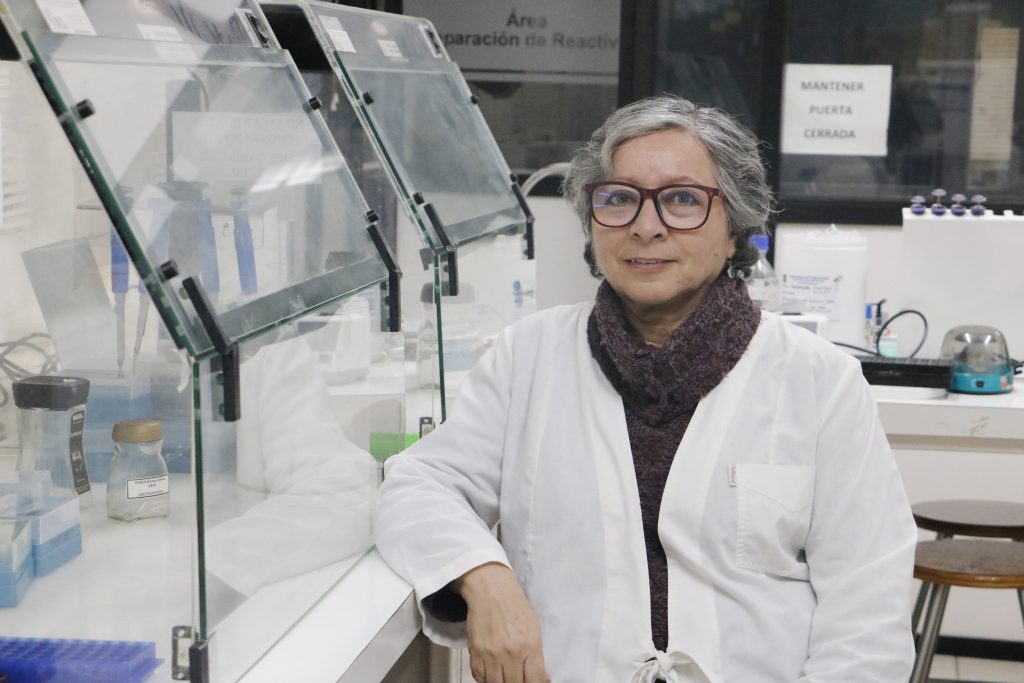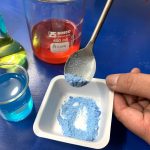By: Soledad Toledo Cabrera lucabrer@udec.cl | Photographs: Courtesy of the Office of the Vice-Rector for Research and Development
For over 20 years, Dr. Apolinaria García Cancino has been focusing her research on a microorganism, found in almost 70% of the Chilean population. Her interest is twofold: the bacteria that caught her attention is Helicobacter pylori, responsible for several gastric pathologies, including colon cancer. In addition, its high presence among Chileans is unusual, which inspired her to look for methods to treat the infection, and at the same time, prevent it.
In this quest, Dr. Apolinaria found a probiotic strain capable of preventing Helicobacter from thriving in the human stomach. In a clinical study, conducted to evaluate the functionality and effectiveness of the strain, it was shown that only 2.7% of volunteers who received the probiotic were infected by H. pylori. On the other hand, in the placebo group, the infection reached 34.2%. The research thus achieved a promising result, showing that the consumption of this probiotic reduces the risk of contracting the pathogen, with an efficacy of at least 92.1%.

This means that, finally, hundreds or thousands of people could be prevented from suffering gastric pathologies derived from infection with these bacteria. But how do you take these laboratory results from the academic world to the society that needs them?
Knowledge transfer
With the results, Dr. García approached the Transfer and Licensing Office of the University of Concepción, a team that accompanied her from the initial studies to protect the research results. Together with them and with the collaboration of the Apta Hub, she began to talk with the national biotechnology company, Liva Company, who became interested in licensing the new product.
“Apolinaria and her research team are the example of perseverance and focus to reach their goal”, commented Andrea Catalán Lobos, executive director of OTL UdeC. “The path to reaching maturity in an R&D result of this nature is slow, complex, and expensive in countries like ours and only a greater commitment such as impacting society, leadership like that of this researcher, and permanent institutional support, allows us to reach this moment, which we all celebrate,” she added.
The meticulous work of the researcher and her team made it possible to quickly standardize the strain’s cultivation, with which Liva Company launched the product on the market in March 2023. Within a few months the product sold out of stock. Catalina Garrido Rojas, co-founder and technical director of the company, said: “We are very pleased with this milestone of technological transfer and to be responsible for the probiotic reaching the national and regional market.”
In June, the product was licensed to the Italian company Sacco System, who market the probiotic to their markets in Europe, Asia, and Asia Pacific. In September, the company reported that almost 40 tons of the probiotic had been sold in Germany, driven by that nation’s policy of preventing such diseases.
Acknowledgments and New Horizons
The constant work of Dr. García, who leads the University of Concepción’s Bacterial Pathogenicity laboratory, has led to important acknowledgments for her. In addition to receiving financial support from the National Research and Development Agency through several competitive funds, she received an award at the Science with Impact Awards 2022, in the category “Women in Technology Transfer”, for leading different technologies based on the study of gastrointestinal pathogens and probiotics.
“It is important that knowledge does not stay in publications, which we already have. That was not what I dreamed of. What I wanted was to see what I have studied all my life became a product that could serve society,” said the researcher when thanking for the Award.
Her leadership and tenacity were also distinguished at the XVI Avonni Award Ceremony, organized by the Innovation Forum Foundation, the Ministry of Science, Technology, Knowledge and Innovation, El Mercurio, and TVN. On the occasion, she was the winner together with her team in the Roche Health and Science categories and the 2022 Innovative Woman Award. In 2023, she was highlighted as an “Innovative Person” by the Innovation and SMEs Committee of the Biobío Production and Trade Confederation (CPC Biobío).
The license of the strain and the awards do not mean the end of her career for Dr. Apolinaria. On the contrary, with the experience and knowledge accumulated in the study of probiotics, she and her team are now working on fighting against another common inflammatory disease: acne. Focused once again on prevention rather than treatment, she is making progress in the formulation of a cosmetic that takes advantage of the probiotic properties of a strain capable of fighting the Cutibacterium acnes bacteria, responsible for this condition. Her initiative was selected by the APTA Hub’s Fill The Gap program, to speed up the negotiation and commercialization of new technologies.
Last modified: 3 de septiembre de 2025






